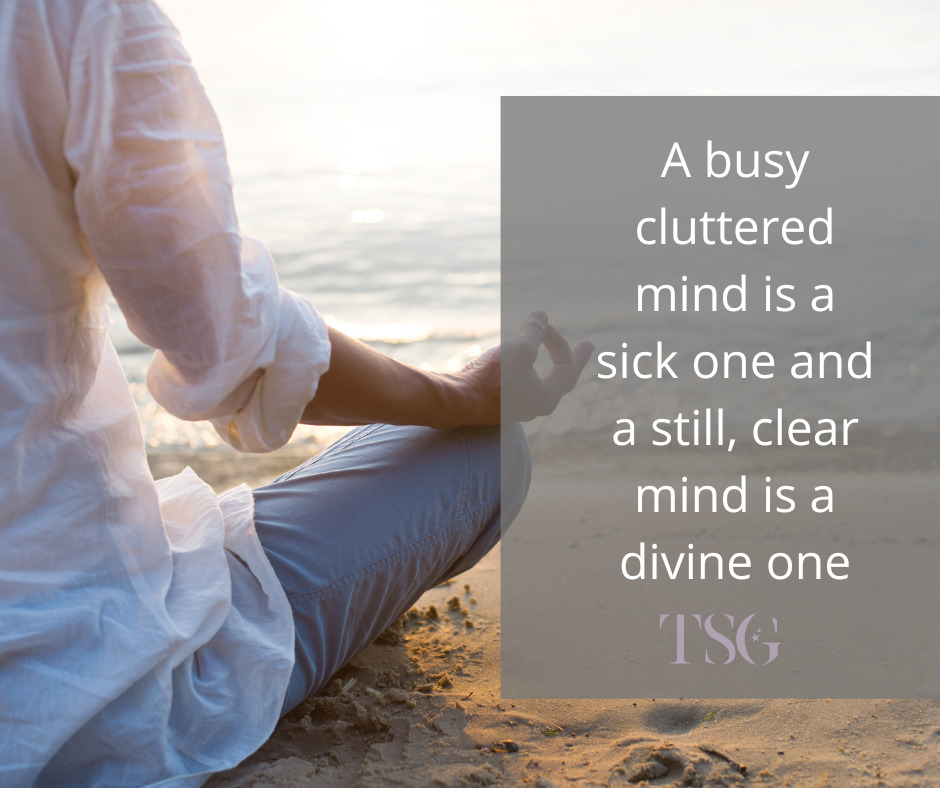
Guide to maintaining your meditation practise
Many people give up at the first hurdle in their meditation practise.
This very simple guide to maintaining your meditation practise may help you stay on track!
I meet lots of people who are convinced they’re just unable to meditate. They’ve tried, perhaps numerous times, but they just can’t do it.
There is this big myth out there that when you meditate, your mind is empty – so if you sit down to meditate, and you start thinking about what to cook for dinner, you’re not doing it properly, you think you’re failing!
People tend to think that meditators don’t have those pesky thoughts during meditation
The truth is, everyone does. It’s how you react to them that makes the difference!
Your mind is a thinking machine – it wants to do its job!
When we sit down to meditate, we try to make our minds focus only on the object of meditation.
The mind’s instant reaction to this is to feel that it can’t go on telling its stories.
With practice, the ego mind starts to lose control over your thoughts and you can start to engage in them less and just let them pass by. You will simply acknowledge them, but not start having a conversation with them.

In the famous story of the Bhagavad Gita, the distraught prince Arjuna says to his teacher Krishna:
“It’s impossible, Krishna! My mind is so restless, so turbulent, I can’t imagine ever being able to achieve the loftiness you’re teaching. The human mind is a nursery of waywardness, so strong it can drag an elephant, full of stubburn desires and wordly things. Indeed, it’s like a mule. If it doesn’t get what it wants it turns petulant and scheming. My mind can never be caught. It never halts in one place. Trying to catch and tame it is like trying to restrain the wild wind”
Krishna reassures Arjuna:
“You know the nature of the mind, Arjuna, it’s restless and hard to subdue, but it can be done”
You might think it’s impossible to control the mind, but we need to understand that controlling the mind is not the same as emptying the mind. It’s a case of becoming less involved in thoughts as they come up.
Don’t worry if you find yourself thinking during meditation, the practice is to not engage with the thoughts and let them go.
If we can stick with our practice, while our mind tries to make us get up and clean the kitchen, walk the dog or watch a soap on TV, eventually we will get past that and actually start craving the quiet in meditation.
Many people also ask, what sort of meditation should I start with?
One of the best ways to start, is to have a mantra or something to fix your mind on. Deepak Chopra’s Primordial Sound Meditation is a great way to start because the workshop will give you a good foundation and guide to meditation and what happens in meditation.
Click here to find out more about Primordial Sound Meditation
Here are my keys to meditation:
Stick with it! Commit yourself to 40 days, and make sure you stick to it – even if most of those 40 days are spent trying to ignore the itch on the end of your nose! You need to give your mind time to settle, and meditating every now and then when you’re in the mood is not the way to do that!
Do it at the same time every day, preferably early morning – before your mind has woken up and become preoccupied with all the things we think about during the course of the day.
Don’t make excuses. I’m sure you can come up with 10 cast iron excuses right now, as to why you couldn’t or shouldn’t meditate first thing tomorrow morning. If you want to start to meditate, get on and do it. Ignore the excuses!
Prepare your space. Things like candles, incense, and deities can help to bring you into your meditation space.
Remember that your mind will make excuses. Sometimes we think there’s a real reason we can’t meditate – but really what’s actually happening is that the mind is scared of this new territory called peace and space; it’s not used to it, and will do anything to avoid it – which is why your nose always itches within 5 minutes of beginning your meditation!
Enjoy!
Research: Dr Benson in Psychology today
